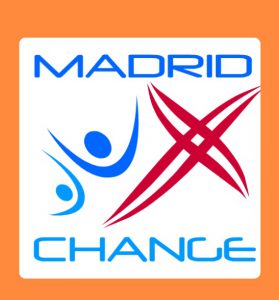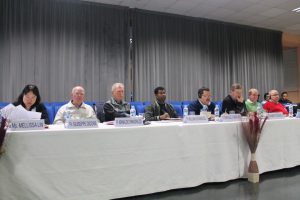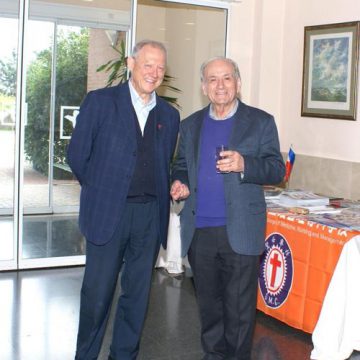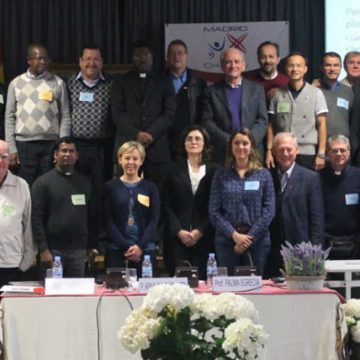The Humanisation of Health and Access to Care
21-24 April 2016
Centro de Humanización de la Salud
Tres Cantos, Madrid
 The meeting of directors of Camillian centres for pastoral care/humanisation, of universities, of the Camillianum and Camillian medical doctors, which was organised by the General Secretariat for Ministry, witnessed the participation of thirty three religious and lay people: nine members from the continent of Asia, nine from America, eight from Africa, and the rest from Europe. They represented thirteen centres for pastoral care/humanisation (Colombia, Ecuador, Peru, Mexico, Brazil, USA, Burkina Faso, Kenya, Italy, Spain, India, Thailand, the Philippines); two universities (Rome and San Paolo); and two nursing schools (Taiwan and Ouagadougou). In addition, eight Camillian medical doctors were present at the meeting.
The meeting of directors of Camillian centres for pastoral care/humanisation, of universities, of the Camillianum and Camillian medical doctors, which was organised by the General Secretariat for Ministry, witnessed the participation of thirty three religious and lay people: nine members from the continent of Asia, nine from America, eight from Africa, and the rest from Europe. They represented thirteen centres for pastoral care/humanisation (Colombia, Ecuador, Peru, Mexico, Brazil, USA, Burkina Faso, Kenya, Italy, Spain, India, Thailand, the Philippines); two universities (Rome and San Paolo); and two nursing schools (Taiwan and Ouagadougou). In addition, eight Camillian medical doctors were present at the meeting.
The programme began on Thursday 21 April in the morning with an opening ceremony, the reading of the message of the Father General, and a paper by Fr. Angelo Brusco on ‘mission and the past and future prospects of centres for pastoral care’. This was followed by the comments of groups organised according to languages.
In the afternoon, Br. José Carlos Bermejo described the centre of Tres Cantos (for formation in humanisation and elderly people) in a paper. A guided visit then took place by which it was possible to appreciate all of the creativity and commitment to caring in a humanised way that was engaged in by the centre. The day ended with a celebration of the Eucharist in English presided over by Fr. William Eronimoose.
The next day, Friday 22 April, the subject addressed by Fr. Sam Cuarto in his paper was ‘assuring access to health care and quality service’. This father from the Philippines based his paper on a sociological approach, starting with an analysis of the parable of the Good Samaritan commented on by Paul Ricoeur. The observations of the language groups were then presented in the hall with Fr. Antonio Puca acting as the chairman. This was followed by a description of the vocation, mission and activities of Camillian centres for pastoral care in health.
The first group was that of Brazil which was described by Fr. Christian Barchifontaine and then Fr. Marcelo Valentin, with a description of the activities of two universities, three journals, a master’s/doctorate and post-doctorate in bioethics, as well as the Camillian institute for pastoral care in health (ICAPS). The second Brazilian father illustrated the ground-level activities of two Camillian religious who are medical doctors – Fr. Raul Mate and Fr. Adolfo Serripiero. This was because this meeting also had the task of appreciating the profile of a Camillian medical doctor.
The second paper was by Isabel Calderon who described the Camillian centre for humanisation and pastoral care in Colombia, in Bogota, which was founded twenty-five years ago with three programmes: one for pastoral care in health, one for humanisation, and a third for the Lay Camillian Family. It is now aiming at qualifications at the level of university specialisation.
Fr. Enrique Gonzalez described the Centre for Formation in Health in Lima, Peru. This was created fourteen years ago and is establishing itself and growing in terms of what it is offering at the level of formation.
Fr. Alberto Redaelli described the FECUPAL (the Centre for Formation in Palliative Care) in Quito, Ecuador. Its hospice was created two years ago. This is a real ecumenical centre and a centre of high specialisation in its field. Fr. Silvio Marinelli then described the numerous activities of the St. Camillus Centre of Guadalajara (Mexico) with its five areas (formation, accompanying suffering, spirituality and motivation to commitment, voluntary work, and the administration and coordination of institutions).
The day was ended by papers by Fr. Jojo of the centre in the United States of America and by a lay woman, Melissa, of the nursing school of Taiwan which was founded eleven years ago and now has 3,508 students and 176 lecturers. Fr. Paul Ouedraogo then presided over the celebration of the Eucharist in Italian.
The chairman for Saturday 23 April was Fr. Arnaldo Pangrazzi and the day was opened with a paper by the dean of the Camillianum, Palma Sgreccia, on the subject ‘healing and social, ethical and anthropological aspects’. This paper, which was of a high cultural level, ended with many questions above all on the cultural context which is changing many of the most basic concepts of life in the world of health and health care. This was followed by group work, this time with a new departure: amongst the groups a new one was formed made up of eight Camillian medical doctors accompanied by Fr. Aris.
 The afternoon was begun with a very short paper on the Camillianum of Rome by the Secretary General Fr. Michel Favi. After a short exchange of opinions, above all on the relationship between academia and pastoral care, and on the links between the Camillianum and the Order and the Pontifical Lateran University, a presentation of the working groups took place. Fr. Pietro Magliozzi introduced the group of Camillian medical doctors which on this occasion was meeting for the second time (the first was in Rome in the year 2001). After describing the various forms of important and characteristic witness that they offer in various settings of the apostolate, they discussed the possibility of creating an EMT (emergency medical team). This is a new institution accredited by the WHO which requires official international training and initiatives lasting fifteen days or a month in places where there are epidemics. The Camillian medical doctors did not offer any resistance to their taking part in a call of this kind by the Order, given that it was simply their response to the fourth vow and nothing else but what they should do.
The afternoon was begun with a very short paper on the Camillianum of Rome by the Secretary General Fr. Michel Favi. After a short exchange of opinions, above all on the relationship between academia and pastoral care, and on the links between the Camillianum and the Order and the Pontifical Lateran University, a presentation of the working groups took place. Fr. Pietro Magliozzi introduced the group of Camillian medical doctors which on this occasion was meeting for the second time (the first was in Rome in the year 2001). After describing the various forms of important and characteristic witness that they offer in various settings of the apostolate, they discussed the possibility of creating an EMT (emergency medical team). This is a new institution accredited by the WHO which requires official international training and initiatives lasting fifteen days or a month in places where there are epidemics. The Camillian medical doctors did not offer any resistance to their taking part in a call of this kind by the Order, given that it was simply their response to the fourth vow and nothing else but what they should do.
Fr. William Eronimoose described the centre for pastoral care in health in India and then proceeded to describe the centre for pastoral care in health in Manila, the Philippines, with Fr. Rodel. Its activity has expanded since six years ago when a Camillian father became director of pastoral care in health of the Bishops’ Conference of the Philippines. This demonstrates the importance of the political-institutional dimension of pastoral care in health. Similar developments have also been seen in Colombia (1994), Chile (2014) and Kenya (2015) and will also be seen in a little while in Burkina Faso (2016) where the national director of pastoral care in health is a Camillian.
Fr. Jimmy Kitsada then proceeded to describe the centre for pastoral care in health of Bangkok (Thailand) which trained 2,564 people in the year 2015 and works on the subject of healing with the motto ‘pray by serving and healing the sick’. There are many programmes and they are creative.
The centre for pastoral care in Verona, Italy, with its thirty-three years of history, was described by a lay woman, Maria. In this case, as well, its multiple activities and the creativity of the kinds of courses it offers were praised. In these courses Fr. Brusco is the sole animator. The unifying element of this centre is ‘the integral health of the person towards a human and spiritual growth’.
Fr. Edgar Yameogo described the centre for pastoral care in health of Ouagadougou (Burkina Faso). This was begun twenty years ago in a parish and then moved to a separate centre. Last year, thanks to a visit of the President of the Republic and the Minister of Health, its enrolments took off.
Br. Joseph Khiyaniri then described the centre for pastoral care in health in Kenya. It was born fifteen years ago in a room but for a year it has operated in its own centre. Brother Julien, a Camillian medical doctor, described the school for pastoral care in health in Benin which aims at holistic care and has the goal of healing and liberation from evil in all of its forms.
Fr. Aris Miranda was responsible for the ending of the meeting and exhorted those present to create networks of international and cooperation between the centres and to become more inculturated and more prophetic, protecting the most vulnerable, starting with the EMT (emergency medical team) in order to respond to emergencies together with the World Health Organisation. Summarising everything in a motto, Fr. Aris said: work together to humanise, that is to say to give health and rights, or to be a community united in learning and service. All those who had made the meeting possible at the level of logistics were thanked, and God was also thanked for having given us an opportunity for formation at a very high level as well as for our proud membership of the Camillian Order. The last day of the meeting ended with a celebration of the Eucharist in Spanish presided over by Fr. Marcelino de Oliveira.
The recommendations that arose from the groups are the following: CLICK HERE

















Camillians on Facebook
Camillians on Twitter
Camillians on Instagram